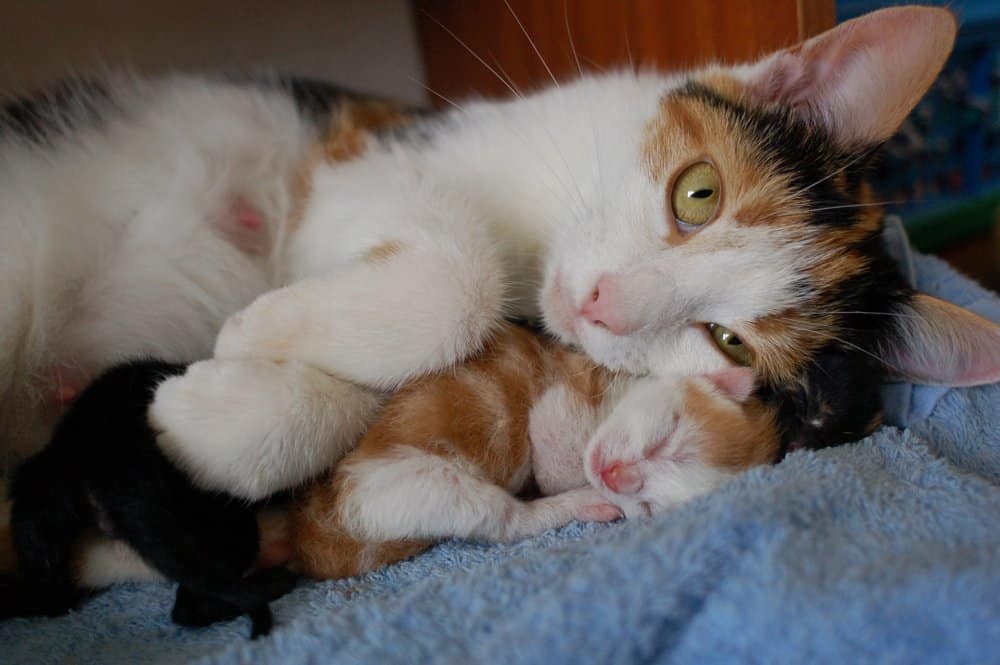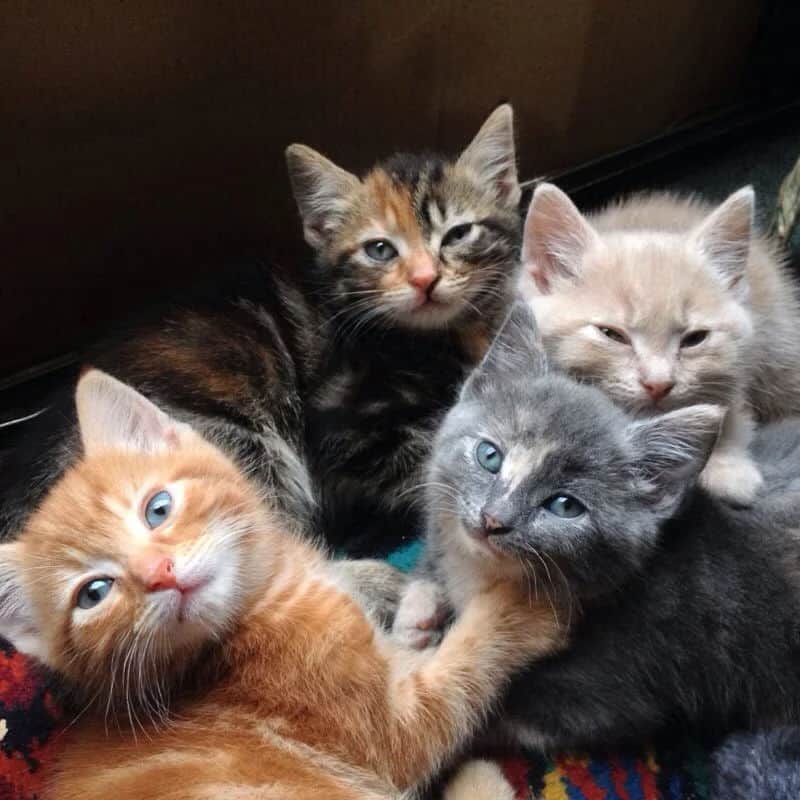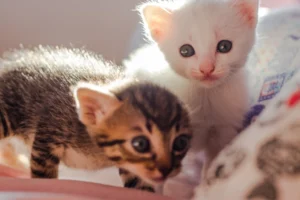Disclosure: We may earn a commission from helpful, relevant links in our content. No cost to you. See our privacy policy.
When mother cats reach a certain age, they grow intolerant of their babies. It’s an instinct that drives the kittens to explore on their own. Sometimes the mother cat becomes agitated because she no longer knows the kitten’s scent. There may be some stress issues that need to be addressed as well

Why Would Mother Cat Be Rough With Her Kittens?
Moms begin pushing their kittens away when they reach the weaning period. She does this partly to make them quit nursing and to prepare for the next litter. Spaying can help with this behavior.
Studies have shown that mother cats who have been previously exposed to stressful environments may display heightened sensitivity when their kittens play roughly or feed for longer periods. Creating a serene environment for her, perhaps with calming pheromone sprays, can be a helpful step.
I regularly see mother cats push their kittens away at a particular age to wean them off the milk. The kitten may be trying to breastfeed, and she doesn’t like it.
The age at which weaning stops differs from cat to cat. Some moms stop nursing after four weeks, while others refuse to wean after three months.
Another reason a mother cat appears rough is that the kittens are attempting to play with her, and she doesn’t want to. It would be beneficial to tire them out or provide her with time alone without them, so they don’t irritate her.
Regularly providing interactive toys can also divert the kittens’ attention, ensuring they have a constructive outlet for their boundless energy, which minimizes the chances of them pestering their mother.
Is your mother able to escape the babies by going somewhere high or somewhere they can’t jump or climb? Put a comfortable bed and some food up there for her so that a mom can take a time-out.
If she is swatting and hissing at the kittens, you may need to remove her for a week until her milk runs out and she can go for her spay. She can return with the kittens in a week or so if she feels better about them. Consult a vet before you do anything about this behavior.
Kitten teeth are sharp, and some mothers can get annoyed when their kittens bite them in a sensitive area. If that’s the case, it’s natural for a mom cat to get annoyed by this and punish the little guy or girl.
Finally, when mom cats are about to give birth to new kittens, they may kick out the current ones. Additionally, many mother cats chase older kittens away to make room for the following litter.
In some cases, a mother cat might isolate one particular kitten more than others. This could be because she senses a health issue in the kitten that’s not apparent to us. It’s crucial to get such kittens checked by a vet, as early detection can make a significant difference in treatment.
Can a Mom Cat Dislike Her Kittens?
A mother cat may act strangely for various reasons, such as disliking or being rough with kittens. In most cases, she’s probably weened them off, and they’re now just an annoyance and a source of resource competition.
When I took my cats to the vet, the ones who went were hissed at by the others when they got home. It’s because the cats smelled different.
To check if it makes a difference, rub a towel on the mama and then rub the kittens with the same towel to transmit the aroma. You may also need to bathe all of them to encourage them to stop, as bathing just one of them may not be enough. Make sure you bathe them properly.
She may have postpartum psychosis, which rarely occurs. It occasionally happens because of the influx of hormones after giving birth. Seek advice from your veterinarian. She may be ill and unable to handle the stress of cleaning and feeding them.
It could also be nonrecognition aggression if a mother cat starts to dislike her kittens out of the blue. It frequently occurs when one cat goes to the vet while the other remains at home. The proposed solution is to separate them for a while and then gradually reintegrate them.
As terrible as it may appear, the kitten will ultimately understand that it should not approach the mother. After a few months, they may simply ignore each other. If not, you might have to rehome one of them.

Can a Mother Cat Reject Her Kitten?
In some situations, the mom cat may reject a kitten if she believes it is the runt of the litter and would endanger the survival of the other kittens. That’s how a lot of kittens wind up in shelters.
She may have had kittens when she was too young. Cats only achieve full maturity once they are two years old. Younger moms are more prone to reject or struggle with their litter, especially if the kittens are nearing when they should be weaned. They may still bother her, and she is at a loss for what to do about it.
Finally, some cats are simply bad parents. Either because of genetics or because their parents never trained them. I’ve heard multiple cat breeders having to remove kittens from mama cats because they cease caring for them or, worse, begin harming them.
On the other hand, some cats are excellent parents, which is why some mother cats accept and co-parent kittens from other litter.
Some cats, particularly stray cats, need supplies that aren’t easily obtained. If the mother cat feeds herself or becomes ill, she may abandon her kittens to survive. She may also abandon them if she fears and feels insecure about returning.
In the wild, a mother cat’s rejection of her kittens often acts as a survival mechanism, not out of malice or dislike. If you witness this behavior in a domestic setting, consider providing separate spaces for the mother and her kittens, ensuring both parties are safe and stress-free.
Do Mother Cats Recognize Their Kittens?
Regardless of how much we anthropomorphize, cats have no idea of family or parenting. After her kittens are weaned, the mother cat forgets about them. When cats are housed in a communal setting, it is only evolutionary advantageous for them to retain familial “bonds” and hierarchies.
When mother and daughter cats are raised together, the mother will usually retain the dominant female position conferred by her age. As a result, owners may regard her actions toward her mature kids as “motherly.”
FAQs
Can mom cats get sad when you take their kittens away?
No matter what people do, cats have to leave their mothers at some point. It shouldn’t bother the mother as long as they are old enough, and they’d be fine unless it were highly abrupt or traumatic. Momma cats will not be upset or sad when kittens go if they are ready.
How to get a mother cat to trust you around kittens?
The best technique to gain a mother cat’s trust with her kittens (especially if they are stray cats) is to feed them. When the cat realizes you’re supplying food and water, she’ll be more likely to trust you. Furthermore, give the cat some room and let the cat approach you.
Do cats get mad when you touch the kittens?
Mother cats can become mad. On the other hand, most house cats will not feel threatened and welcome you near their kittens. It would be best never to touch a mother’s kittens without permission since you never know how she would respond, especially with strays.
Alex, a passionate animal lover, has experience in training and understanding animal behavior. As a proud pet parent to two dogs and three cats, he founded AnimalReport.net to share insights from animal experts and expand his knowledge of the animal kingdom.




